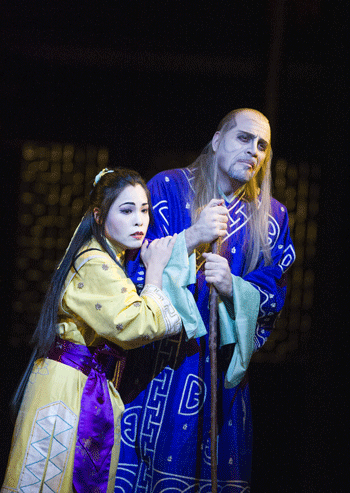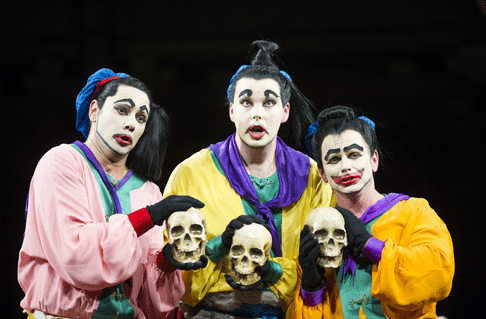![Marco Berti as Calaf and Lise Lindstrom as Turandot [Photo © Tristram Kenton]](http://www.operatoday.com/ROH_2688.gif)
10 Sep 2013
Turandot, Royal Opera
The Royal Opera's production of Puccini's Turandot is nearly 30 years old. Created for the 1984 Olympics, Andrei Serban's production has been revived 15 times.
English Touring Opera are delighted to announce a season of lyric monodramas to tour nationally from October to December. The season features music for solo singer and piano by Argento, Britten, Tippett and Shostakovich with a bold and inventive approach to making opera during social distancing.
This tenth of ten Live from London concerts was in fact a recorded live performance from California. It was no less enjoyable for that, and it was also uplifting to learn that this wasn’t in fact the ‘last’ LfL event that we will be able to enjoy, courtesy of VOCES8 and their fellow vocal ensembles (more below …).
Ever since Wigmore Hall announced their superb series of autumn concerts, all streamed live and available free of charge, I’d been looking forward to this song recital by Ian Bostridge and Imogen Cooper.
Although Stile Antico’s programme article for their Live from London recital introduced their selection from the many treasures of the English Renaissance in the context of the theological debates and upheavals of the Tudor and Elizabethan years, their performance was more evocative of private chamber music than of public liturgy.
Evidently, face masks don’t stifle appreciative “Bravo!”s. And, reducing audience numbers doesn’t lower the volume of such acclamations. For, the audience at Wigmore Hall gave soprano Elizabeth Llewellyn and pianist Simon Lepper a greatly deserved warm reception and hearty response following this lunchtime recital of late-Romantic song.
For this week’s Live from London vocal recital we moved from the home of VOCES8, St Anne and St Agnes in the City of London, to Kings Place, where The Sixteen - who have been associate artists at the venue for some time - presented a programme of music and words bound together by the theme of ‘reflection’.
'Such is your divine Disposation that both you excellently understand, and royally entertaine the Exercise of Musicke.’
‘And there was war in heaven: Michael and his angels fought against the dragon; and the dragon fought and his angels, And prevailed not; neither was their place found any more in heaven … that old serpent … Satan, which deceiveth the whole world: he was cast out into the earth, and his angels were cast out with him.’
There was never any doubt that the fifth of the twelve Met Stars Live in Concert broadcasts was going to be a palpably intense and vivid event, as well as a musically stunning and theatrically enervating experience.
‘Love’ was the theme for this Live from London performance by Apollo5. Given the complexity and diversity of that human emotion, and Apollo5’s reputation for versatility and diverse repertoire, ranging from Renaissance choral music to jazz, from contemporary classical works to popular song, it was no surprise that their programme spanned 500 years and several musical styles.
The Academy of St Martin in the Fields have titled their autumn series of eight concerts - which are taking place at 5pm and 7.30pm on two Saturdays each month at their home venue in Trafalgar Square, and being filmed for streaming the following Thursday - ‘re:connect’.
The London Symphony Orchestra opened their Autumn 2020 season with a homage to Oliver Knussen, who died at the age of 66 in July 2018. The programme traced a national musical lineage through the twentieth century, from Britten to Knussen, on to Mark-Anthony Turnage, and entwining the LSO and Rattle too.
With the Live from London digital vocal festival entering the second half of the series, the festival’s host, VOCES8, returned to their home at St Annes and St Agnes in the City of London to present a sequence of ‘Choral Dances’ - vocal music inspired by dance, embracing diverse genres from the Renaissance madrigal to swing jazz.
Just a few unison string wriggles from the opening of Mozart’s overture to Le nozze di Figaro are enough to make any opera-lover perch on the edge of their seat, in excited anticipation of the drama in music to come, so there could be no other curtain-raiser for this Gala Concert at the Royal Opera House, the latest instalment from ‘their House’ to ‘our houses’.
"Before the ending of the day, creator of all things, we pray that, with your accustomed mercy, you may watch over us."
The doors at The Metropolitan Opera will not open to live audiences until 2021 at the earliest, and the likelihood of normal operatic life resuming in cities around the world looks but a distant dream at present. But, while we may not be invited from our homes into the opera house for some time yet, with its free daily screenings of past productions and its pay-per-view Met Stars Live in Concert series, the Met continues to bring opera into our homes.
Music-making at this year’s Grange Festival Opera may have fallen silent in June and July, but the country house and extensive grounds of The Grange provided an ideal setting for a weekend of twelve specially conceived ‘promenade’ performances encompassing music and dance.
There’s a “slide of harmony” and “all the bones leave your body at that moment and you collapse to the floor, it’s so extraordinary.”
“Music for a while, shall all your cares beguile.”
The hum of bees rising from myriad scented blooms; gentle strains of birdsong; the cheerful chatter of picnickers beside a still lake; decorous thwacks of leather on willow; song and music floating through the warm evening air.
![Marco Berti as Calaf and Lise Lindstrom as Turandot [Photo © Tristram Kenton]](http://www.operatoday.com/ROH_2688.gif)
The Royal Opera's production of Puccini's Turandot is nearly 30 years old. Created for the 1984 Olympics, Andrei Serban's production has been revived 15 times.
This latest revival opened on September 9 2013 and featured the Covent Garden debuts of soprano Lise Lindstrom in the title role and conductor Henrik Nanasi. The production is in good health and the revival, directed by Andrew Sinclair, was as crisp and involving as ever.
Serban's production, in striking designs by Sally Jacobs and with extensive choreography by Kate Flatt, is lively, busy and full of incident, so that the principals need to give strong performances otherwise the production itself dominates. There was a feeling of this in act one, as if the principals had not quite found their form.
But the opera opened well, with Michel de Souza (on the company's Jette Park Young Artists Scheme) giving a commanding performance as the Mandarin.
 Eri Nakamura as Liù and Raymond Aceto as Timur
Eri Nakamura as Liù and Raymond Aceto as Timur
Marco Berti, singing his first Calaf at Covent Garden, had a robust and thrilling tenor voice thankfully also with a willingness to moderate his tone and sing with a degree of subtlety. But his stage demeanour was rather stiff and failed to catch fire in the first act. Non piangere Liu though nicely shaped, did not touch the heart. His diction throughout was superb and it was great to hear Italian sung by a native.
The three masks, Ping, Pang and Pong were performed by three young singers, Dionysios Sourbis, David Butt Philip and Doug Jones. David Butt Philip is also on the Jette Parker Young Artists programme. In this production the roles are very active and all three brought and admirable physicality to their performances, but I found that they did not seem entirely threatening enough. Balance also was not ideal with the middle of the three voices not quite projected enough, seeming slightly weaker.
Eri Nakamura, a former Jette Parker Young Artist returning to sing her first Liu at Covent Garden. She has a vibrant lyric voice with a warm vibrato, which she makes intelligent use of. She made a touching Liu giving a finely shaped performance of Signore ascolta. She was well supported by the noble Timur of Raymond Aceto.
The first scene of act two gave the three masks a chance to show their individual talents. Dionysios Sourbis as Ping had a fine, strongly projected baritone voice and impressed with his solo, both David Butt Philip and Doug Jones contributed nicely turned solo moments. The interaction between the three was lively and well coordinated, the three made a great dramatic ensemble but I did rather keep coming back to the issue of balance of the voices.
But throughout the first act and a half, there was also a slight feeling of marking time, that we were waiting for Turandot's entry. And we weren't disappointed. Tall and slim with a brilliant dramatic voice, Lise Lindstrom made a striking Turandot. The opening of In questa reggia seemed to be threatened with too much vibrato. But she settled down and delivered a highly controlled account of the aria, singing with admirable laser-like brightness and control. Perhaps there was a feeling that phrases were broken down too much into individual syllables, but overall this was a highly auspicious and very commanding debut.
Berti made a strong impact in his decisive appeal to the Emperor (Alasdair Elliott) at the opening of the scene, and went on to join Lindstrom for a thrilling account of the riddle scene. Both voices balanced well and the two artists made this a real dramatic moment, rather than purely a musical one. Whilst Berti remained a bit stiff dramatically, this translated into decisiveness and nobility. Lindstrom, by contrast, was superb at suggesting the neurotic nature of Turandot's obsession. Lindstrom was a traditional Turandot, coolly icy with a definite dislike of being touched.
 Dionysios Sourbis as Ping, David Butt Philip as Pang and Doug Jones as Pong
Dionysios Sourbis as Ping, David Butt Philip as Pang and Doug Jones as Pong
Act three opens, of course, with the best known aria in the opera Nessun dorma. Berti was robust here, his voice displaying an admirable consistency throughout the range as well as some sensibility and subtlety. Admirably, he did not grandstand, and the ending was neatly done.
In her two solos in this act Nakamura was supremely touching as Liu, characterful and quite strong. But she shaped Puccini's lines finely, with a nice vibrancy, and certainly touched the heart. The torture scene was well shaped by conductor Henrik Nanasi and there was a feeling of the whole ensemble building inexorable, in just the right way, towards Liu's death. As in the first act, the three masks could have been edgier but Lindstrom's Turandot was a wonderfully icy and commanding presence.
Berti almost used his size to impose himself on Lindstrom and her capitulation, when it came, was sudden and total. Not for the first time, I regretted the lack of Alfano's full ending with the extension to the two solo roles.
Conductor Henrik Nanasi displayed a nice feel for Puccini's opera and the ebb and flow of the music, but in some of the early scenes there was a worrying lack of crispness in the coordination between chorus and pit. The chorus did not seem to be on quite top form, and their off-stage contributions in act three were rather rough.
This performance saw some notable debuts and had some powerful individual performances, but it did not quite add up to a complete experience. Though this may develop over the run, and the piece is being broadcast live in cinemas on 17 September.
Robert Hugill
Cast and production information:
Michel de Souza: Mandarin, Eri Nakamura: Liu, Raymond Aceto: Timur, Marco Berti: Calaf, Dionysio Sourbis: Ping, David Butt Philip: Pang, Doug Jones: Pong, Lise Lindstrom: Turandot, Alasdair Elliot: Emperor Altoum. Henrik Nanasi: Conductor, Andrei Serban: Original Director, Andrew Sinclair: Revival Director, Sally Jacobs: Designs, Kate Flatt: Choreography. Royal Opera House, Covent Garden, 9 September 2013.